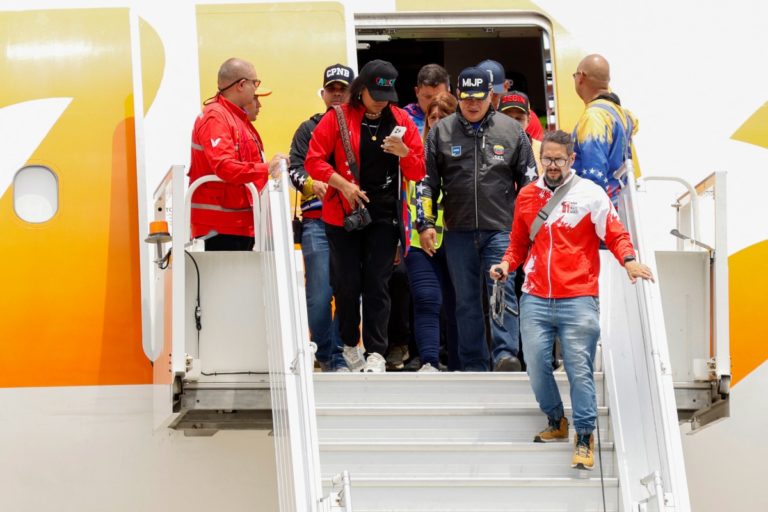
Venezuela's Interior Minister Diosdado Cabello walks down a plane after the arrival of 311 Venezuelan migrants at Simon Bolivar International Airport in Maiquetia, Venezuela, on March 20, 2025. Venezuela on Thursday flew home a planeful of its citizens from Mexico, most of them US-bound migrants whose journey came to a premature end as Washington cracks down on undocumented foreigners. (Photo by Pedro MATTEY / AFP)
Nigeria Rejects U.S. Pressure to Accept Venezuelan Deportees, Defends BRICS Participation
Nigeria has firmly refused to yield to pressure from the Donald Trump administration to accept Venezuelan deportees, including prisoners, from the United States.
Foreign Affairs Minister Yusuf Tuggar made this clear during an appearance on Channels Television’s Politics Today, stating that Nigeria faces enough domestic challenges and cannot serve as a dumping ground for deportees amid Trump’s crackdown on undocumented migrants.
The announcement comes as President Bola Tinubu attended the BRICS Summit in Rio de Janeiro, Brazil, from July 6–7, 2025. On the final day of the summit, U.S. President Donald Trump declared an additional 10% trade tariff on “anti-American” BRICS nations, including China, India, and Nigeria.
However, Tuggar suggested that the tariff threat may not be directly linked to Nigeria’s participation in the summit.
“The issue of tariffs may not necessarily stem from our involvement in the BRICS meeting,” Tuggar said.
He highlighted that the U.S. has been pressuring African nations to accept Venezuelan deportees, many of whom are prisoners. “Nigeria cannot accommodate Venezuelan deportees—we already have a population of 230 million and our own challenges to address,” he emphasized.
Meanwhile, the Tinubu administration has begun discussions with the U.S. over recent visa restrictions imposed on Nigerian nationals.
Tuggar also expressed disappointment over similar visa constraints introduced by the United Arab Emirates.
Nigeria officially joined BRICS+ as a partner country in January 2025. Originally comprising Brazil, Russia, India, China, and South Africa, BRICS was established in 2006 to unite major developing economies and counterbalance the dominance of wealthier Western nations.
The expanded BRICS+ now includes Egypt, Ethiopia, Indonesia, Iran, and the UAE, representing 37% of global GDP, half of the world’s population, and 40% of global economic output.
